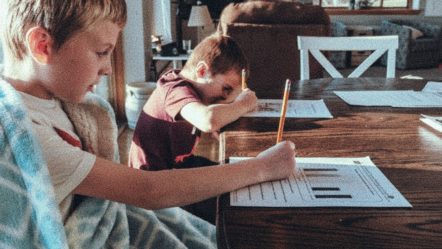“Not everyone can become a great artist; but a great artist can come from anywhere.” -Anton Ego, “Ratatouille”
The public and most Catholic schools are not set up for healthy emotional, spiritual, physical, and intellectual growth for children and adolescents. The exception to this is the Montessori model, but those are not the typical learning environment for most young people. During my nearly 20-year career in teacher education I worked with some excellent teachers and administrators. I also worked with lazy, corrupt, and evil teachers and administrators. All of them, regardless of their intent in being there, were working within a system that is designed to deprive children of what is best for them.
The myriad ways that corporatized education fails children are beyond the scope of this essay. If you are interested in how the public schools are not only failing the poor, but also the middle and upper socioeconomic students, a simple online search will provide many articles on:
(1) How the literacy rate was higher before the advent of public education;
(2) How most Americans believe that public education fails the poor but serves the middle and upper classes well, yet those students also lack historical and civic knowledge, geographic awareness, and the full range of other information/knowledge/wisdom that would make them educated, whole adults;
(3) How the schools were initially set up and continue to be tools of big government and corporations to indoctrinate rather than teach; and
(4) How schools continue to be tools for big government and corporations through federal grants that incentivize standardization and therefore the opposite of what children need, standardized curricula which means millions of dollars for those corporations, horror shows like the Common Core initiative, and bullying on every level and in every corner of them.
The corruption of higher education, especially teacher education, is also beyond the scope of this essay. But seriously I doubt that much in higher education is actually fixable at this point. Possibly the community colleges are salvageable, but not much else.
My husband and I did not initially homeschool our children. But six years in, when our oldest was in 6th grade and our youngest in 1st, we brought them all home. We realized that we had taught them to read, to do arithmetic, and essentially everything else they knew. We had worked with the schools when each year at least one of them had a toxic teacher. We worked with the schools when each year at least one of them was being bullied by peers. We had IEP meetings for our two with disabilities that generally ended in incomplete or zero accommodations.
So they came home. And even my husband, the eternal skeptic, was bowled over by how much better things got immediately. Gone were the days of crying before heading off to be bullied by teachers and peers. Gone were the days of dehydrating themselves so as not to have to ask to use the restroom, which generally encouraged more bullying. Gone were the days of being apart for six to eight hours and with people who neither understood nor cared to understand any of them.
Instead we had morning meeting over breakfast. We had writer’s workshop where everybody worked on their writing during the week and presented during an Author’s Tea on Fridays. We had homeschool soccer with children from 4 to adults and many people with disabilities all having fun and being active. We had chamber orchestra, arts and crafts, and science experiments. All of this occurred at our table and in our bedrooms, and without any bullying, exhaustion, and indoctrination. We went to daily Mass often, and our middle two ended up as servers and lectors/cantors for daily Mass for several years.
I have had parents tell me that they could never homeschool because their child would drive them crazy and they would drive the child crazy. This speaks to more being wrong than schooling. That’s a relationship in crisis that no school can fix. And homeschooling would likely require the family to face those problems and solve them in a way that simply avoiding them never will.
I have had parents tell me that they wouldn’t know where to begin homeschooling. They do not feel competent to teach, especially high school-level curricula. Nonsense. First, children and adolescents would be better off getting library books every two weeks and teaching themselves from those rather than heading into the jaws of the indoctrination factory. And anyone of normal intelligence can learn to teach. Especially if one does not have to cope with the classroom management of 30 bored and inevitably irritable young people. But even so, everything one could want to learn is now available online for free or nearly free. Many dioceses also have homeschooling co-ops where parents with particular expertise can offer classes and/or technical assistance.
The most important reason to homeschool, though, is the faith. I have many friends who are far holier than I whose children have fallen out of the Church due to poor catechesis and open hostility to the faith in Catholic schools. The most important thing for children to learn is the Catholic faith and how to defend their faith. Our children were not spectacularly well catechized, but homeschooling gave us much more time to read the catechism, the Bible, attend (and serve at) daily Mass, become the Society of Saint Vincent de Paul at our parish, engage in pro-life work, and a myriad other ways to interface with the faith and the faithful. Few of those opportunities would have been possible with them slogging off to the factory each day.
Many people will inevitably have one of several reactions to this essay:
(1) But there are lots of great teachers;
(2) But we need two incomes to survive;
(3) But my children need friends/socialization/sports/music;
(4) But the schools can’t be that bad.
If Covid did nothing else, it alerted parents to just how bad schools currently are. Think they couldn’t be as bad as the worse pedophile-grooming-critical race theory horror shows you see on the news? Think again. Future teachers come into teacher education programs with soft hearts and quite often malleable values. They are given Pedagogy of Oppressed and other nonsense to prepare them for the classroom. Even good-hearted teachers often fall for what Condoleezza Rice called, “the soft bigotry of low expectations.” One good-hearted teacher doing a reasonably good job in his or her classroom cannot stem the torrent of horror coming toward children each day. Children make better friends when they are not forced to be with a group of students whose only commonality is their manufacture date. They can make friends at church, including the friendship of the elderly at daily Mass, in sports and music, and most importantly of their siblings and extended family.
One significant part of the horror of schools is the curricula that are selected. That is outside the wheelhouse of the average teacher. They teach what they are given, from texts standardized at the state or federal level, and aligned to whatever silly standards they are given by the overlords. Much of this is also beyond the scope of this essay, but the curious can search out:
(1) The organizations instrumental in the common core state standards initiative;
(2) The unholy relationships between state departments of education, the federal department of education, publishers, technology companies, and higher education programs;
(3) The universal failure of No Child Left Behind; and
(4) The ways that states have found to circumvent the requirements of the 1975 Education for All Handicapped Children Act and the amendments to it in 1990 that changed it to the Individuals with Disabilities Act.
My family had two incomes when we decided to homeschool. Fortunately, we had decided to buy a house that we could afford if one of those incomes went away. And so it did. It was a difficult transition in some ways, but absolutely worth it when I see how faith-filled and relatively undamaged my children are as adults. It’s also possible to partner with other homeschooling families. It’s also possible to work different shifts. The most important work in this life is creating saints. We gave up vacations, second cars, and anything else necessary to reach that goal.
In the Pixar film “Ratatouille,” the main character is inspired to begin cooking because of a famous chef. The famous chef’s book is called Anyone Can Cook. Cooking and teaching are quite similar in this respect. No rocket science needed. In fact, once she was in our home environment, our younger daughter, who has an auditory processing disorder, taught us how to teach her. She was empowered to find what worked and has become a life-long learner who loves Shakespeare and history. Most people do not even realize she has a disability, even though the experts all told us when she was 3 that she could never live a normal life.
As the quote from Anton Ego suggests at the beginning of this piece, we cannot all be great artists. But we can all give our all for our domestic churches and ensure that we are the parents and teachers our children need. With what appears to be on the horizon in this country, now is the time.








